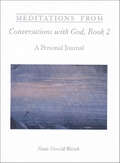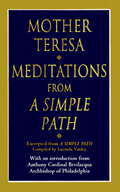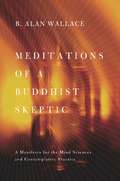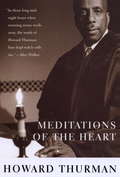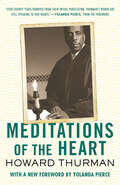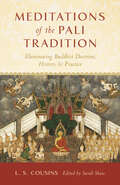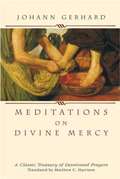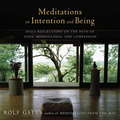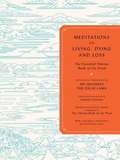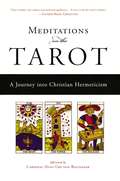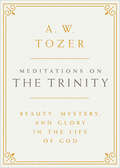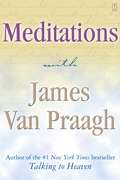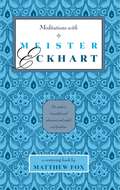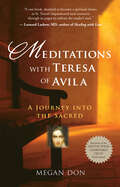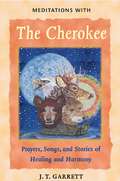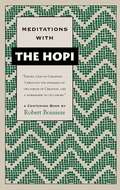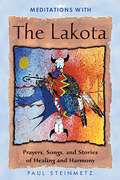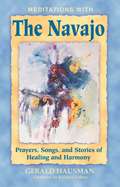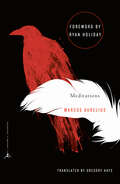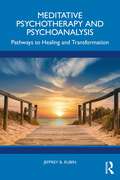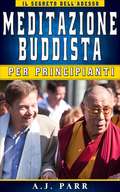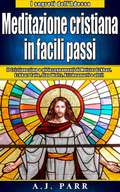- Table View
- List View
Meditations from Conversations With God, Book 2: A Personal Journal
by Neale WalschMillions of people have read the Conversations with God series and have wondered how to incorporate the knowledge contained in them into their own lives. If you would like to have your own conversation with God, Meditations from Conversations with God, Book 2 is the ideal place to start. This journal is a great tool for building a new tomorrow, one day--and one person--at a time.
Meditations from a Simple Path
by Mother Teresa Mother Teresa"Works of love are always works of joy.""Do we look at the poor with compassion? They are hungry not only for food, they are hungry to be recognized as human beings.""There is only one God and He is God to all; therefore it is important that everyone is seen as equal before God."These rich words of wisdom and conviction are among the pearls of thought found in Meditations from A Simple Path. Comprised of luminous selections culled from the New York Times bestseller, this warm and very loving volume is a joyful celebration of prayer, faith, love, service, and peace.Profound and uplifting, this elegant book will provide a tremendous source of inspiration for you or someone you love. It is brimming with timeless messages for us all.From the Hardcover edition.
Meditations of a Buddhist Skeptic: A Manifesto for the Mind Sciences and Contemplative Practice
by B. Alan WallaceA radical approach to studying the mind.Renowned Buddhist philosopher B. Alan Wallace reasserts the power of shamatha and vipashyana, traditional Buddhist meditations, to clarify the mind's role in the natural world. Raising profound questions about human nature, free will, and experience versus dogma, Wallace challenges the claim that consciousness is nothing more than an emergent property of the brain with little relation to universal events. Rather, he maintains that the observer is essential to measuring quantum systems and that mental phenomena (however conceived) influence brain function and behavior.Wallace embarks on a two-part mission: to restore human nature and to transcend it. He begins by explaining the value of skepticism in Buddhism and science and the difficulty of merging their experiential methods of inquiry. Yet Wallace also proves that Buddhist views on human nature and the possibility of free will liberate us from the metaphysical constraints of scientific materialism. He then explores the radical empiricism inspired by William James and applies it to Indian Buddhist philosophy's four schools and the Great Perfection school of Tibetan Buddhism. Since Buddhism begins with the assertion that ignorance lies at the root of all suffering and that the path to freedom is reached through knowledge, Buddhist practice can be viewed as a progression from agnosticism (not knowing) to gnosticism (knowing), acquired through the maintenance of exceptional mental health, mindfulness, and introspection. Wallace discusses these topics in detail, identifying similarities and differences between scientific and Buddhist understanding, and he concludes with an explanation of shamatha and vipashyana and their potential for realizing the full nature, origins, and potential of consciousness.
Meditations of a Buddhist Skeptic: A Manifesto for the Mind Sciences and Contemplative Practice
by B. Alan WallaceA scholar of both spirituality and science proposes a radical approach to studying the mind with the goal of restoring human nature—and transcending it. Renowned Buddhist philosopher B. Alan Wallace reasserts the power of shamatha and vipashyana, traditional Buddhist meditations, to clarify the mind's role in the natural world. Raising profound questions about human nature, free will, and experience versus dogma, Wallace challenges the claim that consciousness is nothing more than an emergent property of the brain with little relation to universal events. Rather, he maintains that the observer is essential to measuring quantum systems and that mental phenomena (however conceived) influence brain function and behavior. Wallace embarks on a two-part mission: to restore human nature and to transcend it. He begins by explaining the value of skepticism in Buddhism and science and the difficulty of merging their experiential methods of inquiry. Yet Wallace also proves that Buddhist views on human nature and the possibility of free will liberate us from the metaphysical constraints of scientific materialism. He then explores the radical empiricism inspired by William James and applies it to Indian Buddhist philosophy's four schools and the Great Perfection school of Tibetan Buddhism. Since Buddhism begins with the assertion that ignorance lies at the root of all suffering and that the path to freedom is reached through knowledge, Buddhist practice can be viewed as a progression from agnosticism (not knowing) to gnosticism (knowing), acquired through the maintenance of exceptional mental health, mindfulness, and introspection. Wallace discusses these topics in detail, identifying similarities and differences between scientific and Buddhist understanding, and he concludes with an explanation of shamatha and vipashyana and their potential for realizing the full nature, origins, and potential of consciousness. &“His range and depth of knowledge is astounding, and his linking of this knowledge to the practices and views of science is unique.&” —Arthur Zajonc, author of Catching the Light
Meditations of the Heart
by Howard ThurmanMeditations of the Heart is a beautiful collection of meditations and prayers by one of our greatest spiritual leaders. Howard Thurman, the great spiritualist and mystic, was renowned for the quiet beauty of his reflections on humanity and our relationship with God. This collection of fifty-four of his most well-known meditations features his thoughts on prayer, community, and the joys and rituals of life. Within this collection are words that sustain, elevate, and inspire. Thurman addresses those moments of trial and uncertainty and offers a message of hope and endurance for people of all faiths.
Meditations of the Heart
by Howard Thurman&“As poet, prophet, and priest, Thurman builds upon a powerful legacy of ancestral hope: belief in a liberating God who can always be found &‘in and among the struggling.&’&”—Yolanda PierceA universal beacon of hope and endurance for people of all faiths seeking to meet the challenges, uncertainties, and joys of lifeHoward Thurman&’s Meditations of the Heart is a beautiful collection of over 150 prayers, poems, and meditations on prayer, community, and the joys and rituals of life by one of our greatest spiritual leaders. Thurman, a spiritualist and mystic, was renowned for the quiet beauty of his reflections on humanity and our relationship with God.In a new foreword, Yolanda Pierce, dean of Howard University&’s School of Divinity, calls attention to the justice-centered theological framework of Thurman&’s words. Pierce notes how Thurman brings to light an image of God who can always be found &“in and among the struggling,&” both in times of weariness and in strength.First written for and shared with his congregation of the Church for the Fellowship of All Peoples in San Francisco, California, these meditations sustain, elevate, and inspire. They are a universal beacon of hope and endurance for people of all faiths seeking to meet the challenges, uncertainties, and joys of everyday life with a renewed and liberating faith.
Meditations of the Pali Tradition: Illuminating Buddhist Doctrine, History, and Practice
by L. S. CousinsA groundbreaking and detailed presentation of the rich system of meditation traditions that have come to us through the Pali tradition of Buddhism.Meditations of the Pali Tradition, from consummate scholar of Pali Buddhism L. S. Cousins, explores the history of meditation practice in early or Pali Buddhism, which was established in various parts of South and Central Asia from the time of the Buddha and developed until at least the fourteenth century CE. Ranging in discussion of jhana (absorption) meditation in ancient India to the Buddhist practice centers of the Silk Road to the vipassana (insight) practices of our modern world, this rigorous and insightful work of scholarship sheds new light on our understanding of the practices that are today associated with the Theravada school of Buddhism and the insight meditation movement. Cousins demonstrates that there is much more to Buddhist meditation than mindfulness alone—concentration and joy, for example, are equally important.
Meditations on Divine Mercy: A Classic Treasury of Devotional Prayers
by Johann Gerhard Matthew C. HarrisonMeditate on these classic devotional prayers. A prolific writer, professor, and pastor, Johann Gerhard is regarded as one of the greatest theologians and thinkers of his time. This book is a translation of a book of prayers that Gerhard wrote prior to 1612. Now newly translated, Meditations on Divine Mercy is available for English readers to enjoy and appreciate. A chapter on the purpose and benefits of prayer is also included as well as an explanation of the aspects of daily meditation. The prayers are divided into four sections: sin, God's gifts, personal needs, and others' needs.
Meditations on Intention and Being
by Rolf GatesYoga has never been more popular. Throughout the United States, people are turning to this ancient practice as a response to the pressures of today's hectic world. In Meditations on Intention and Being, acclaimed yoga teacher Rolf Gates draws on twenty years of teaching experience to explore and explain how to take the mindfulness of yoga off the mat and integrate it into every aspect of life. Presented in the form of 365 inspirational daily reflections, Gates helps readers--from experienced yogis to novices seeking a little tranquility--to fundamentally reconsider their relationships with their minds, bodies, and the universe around them through self-reflection. Over the course of seven chapters, he explores Effortlessness, Nonviolence, The Spirit of Practice, Mindfulness, Compassion and Loving-kindness, Equanimity and Joy, and Intention and Being, giving readers the tools they need to effect positive changes in their lives.
Meditations on Living, Dying, and Loss
by Dalai Lama Thupten Jinpa Gyurme Dorje Graham ColemanSelections from Penguin's authoritative first complete translation of The Tibetan Book of the Dead One of the most inspiration and compelling works in world literature; The Tibetan Book of the Dead presents a visionary exploration of both the after-death state and the inner workings of our perceptual states during life. Meditations on Living, Dying, and Loss offers selected extracts from this influential text, focusing on perspectives and insights that are the most relevant to our modern experience of life, death, and loss. Each chapter is prefaced by the editor of the acclaimed unabridged translation, Graham Coleman. Here, in his accessible and moving essays, he illuminates the text's secrets, revealing the immense creativity that deepening out insight into the relationship between living and dying can bring.
Meditations on the Tarot: A Journey into Christian Hermeticism
by Anonymous Robert Powell Hans Urs von BalthasarPublished for the first time with an index and Cardinal Hans Urs von Balthasar's afterword, this new English publication of Meditations on the Tarot is the landmark edition of one of the most important works of esoteric Christ-ianity. Written anonymously and published posthumously, as was the author's wish, the intention of this work is for the reader to find a relationship with the author in the spiritual dimensions of existence. The author wanted not to be thought of as a personality who lived from 1900 to 1973, but as a friend who is communicating with us from beyond the boundaries of ordinary life.
Meditations on the Trinity: Beauty, Mystery, and Glory in the Life of God
by A. W. TozerFrom one of the 20th century's most beloved spiritual writersA. W. Tozer is known for many things. He's known for his powerful writing style. He's known for being vigorously biblical. And he&’s known for gazing upon God intently in Word and prayer, and then telling readers plainly what he sees. All of these aspects of Tozer shine through in Meditations on the Trinity. Divided into four parts—one for each person of the Trinity, and one for the Godhead three-in-one—this volume compiles excerpts from Tozer's writings into a collection of daily readings to help you grow in you understanding of a central Christian doctrine. No one can over-contemplate the Trinity. It is an inexhaustible mystery, and one that rewards sustained reflection. Readers of Meditations on the Trinity will receive a more accurate view of who God is, and in turn offer Him truer worship. We exist to know and praise God, and this book will help readers do just that.
Meditations on the Trinity: Beauty, Mystery, and Glory in the Life of God
by A. W. TozerFrom one of the 20th century's most beloved spiritual writersA. W. Tozer is known for many things. He's known for his powerful writing style. He's known for being vigorously biblical. And he&’s known for gazing upon God intently in Word and prayer, and then telling readers plainly what he sees. All of these aspects of Tozer shine through in Meditations on the Trinity. Divided into four parts—one for each person of the Trinity, and one for the Godhead three-in-one—this volume compiles excerpts from Tozer's writings into a collection of daily readings to help you grow in you understanding of a central Christian doctrine. No one can over-contemplate the Trinity. It is an inexhaustible mystery, and one that rewards sustained reflection. Readers of Meditations on the Trinity will receive a more accurate view of who God is, and in turn offer Him truer worship. We exist to know and praise God, and this book will help readers do just that.
Meditations with James Van Praagh
by James Van PraaghMeditate Your Way to True Peace and WisdomMeditations with James Van Praagh is an inspiring collection of meditations and affirmations that will empower you to connect with your inner self. Bestselling author and renowned spiritual medium Van Praagh offers over forty meditations, each of which addresses a specific issue or concern that may be blocking your spiritual journey, such as "Release the Past," "Confronting Fears," and "Tuning In to Abundance." By helping you to truly see, feel, and listen to your inner voice, Van Praagh leads you to develop the wonderful, innate abilities that let you become your best self.
Meditations with Meister Eckhart
by Matthew FoxMeister Eckhart was a 13th-century mystic, prophet, feminist, declared heretic, and an early advocate of creation-centered spirituality. This tradition affirms humanity’s potential to act divinely, and it embraces life--living and dying, growing old and sinning, groaning and celebrating--as the creative energy of God in motion. For Eckhart, to be spiritual is to be awake and alive; creation itself was for him the primary sacrament that begins from “the spring of life” or the heart. Eckhart’s pathway and that of the creation tradition is a simple way. It demands no gurus, no fanciful methods, no protracted exercises or retreats. This is why he called it a “wayless way” that is available to everyone, and why he points out that the person “who has found this way needs no other.”
Meditations with Teresa of Avila: A Journey into the Sacred
by Megan DonMeditations with Teresa of Avila invites you to explore the depths of your inner being by following the pathway of the beloved mystic Teresa of Avila. Born into Spanish nobility in 1515, Teresa entered the monastic life at twenty and was eventually guided to reform the Carmelite Order. She blended a rich mystical inner life with everyday work in the secular world, and she remains an unparalleled source of inspiration for living deeply and effectively in both realms. Always concerned with the practical application of her beliefs, Teresa wrestled with questions of worth and place. She sought to understand what her visions and experiences meant and whether she was doing all she could for the divinity she loved and served. Her ideas were rejected by many of her contemporaries, and she struggled against the many male clerics who tried to invalidate her mystical experiences. Her spiritual exploration formed the basis of the prolific body of writing she left to the world. Megan Don makes Teresa's timeless wisdom fully contemporary through translations of Teresa's words followed by practical interpretations and brief, inviting meditations. In this award-winning book, Teresa of Avila and Don guide you to explore the voice of the Beloved and knowledge of the self, the restlessness of the mind and the care of the body, doubt, loss, intimacy, and more.
Meditations with the Cherokee: Prayers, Songs, and Stories of Healing and Harmony
by J. T. Garrett• A collection of earth-centered meditations to enhance our connection to the natural world. • Reveals the Old Wisdom of the Cherokee elders for living in harmony with all beings. • Written by J. T. Garrett, of the Eastern Band of Cherokee, who was taught the ancient ways by his grandfather and other medicine men of his tribe. In a time before ours, humans could talk with animals, hear whisperings from plant life, and understand the origin stories written in the stars. Survival depended on active kinship with family and tribe, with four-leggeds and plant people, with sun and moon and fire. The Cherokee, known widely as the Principal People or the First People, hold a deeply tapestried collection of stories about human interrelatedness with nature. Those stories, passed down through countless generations of Cherokee, are especially significant at this time in human history, when Mother Earth suffers under the weight of unchecked "progress." As a boy, J. T. Garrett sat beside his grandfather and the other medicine men of his tribe as they chanted and drummed the stories of his ancestry. From those stories of Nu-Dah (the Sun), Grandmother Moon, Spring Rain, and Little Eagle comes this collection of active meditations for reconnecting with the natural intelligence that is our birthright. Recognizing that we are all kin in the Universal Circle of life opens us to communication with all beings, bringing us back to our natural spirit selves. If we listen carefully to the Cherokee stories of the Old Ways we can gain understanding of lost social and spiritual traditions that can help ensure a thriving future.
Meditations with the Hopi
by Robert BoissiereThis is a story of creation and change, of prophecy and fulfillment in the world we all journey through--a world the Hopi call koyaanisqatsi, or "world out of balance." A heartfelt and reverential view of the Hopi Way as seen by one of the few white men to have lived within this ancient culture, Meditations with the Hopi imparts to us the essence of the Hopi experience--from child's first cry to soul's departure, each transition celebrated in song and ritual.
Meditations with the Lakota: Prayers, Songs, and Stories of Healing and Harmony
by Paul Steinmetz• Native American meditations that help the reader find spirit in everyday life. • Intimate meditations offer insight into the symbology of the Lakota religious experience. • Lakota elders present the ancient prayers that weave together psyche and spirit. • New Edition of Meditations with Native Americans. The Lakota, people of the sacred buttes of the Black Hills, hold a rich tradition that connects the world of visible creation to the world of spirit. A century after the battle at Wounded Knee, Lakota elders are beginning to speak their belief that this spirituality is indigenous to every man and woman. By inviting all nations to recognize their interdependence with one another and with the earth, Native Americans can help modern man and woman find a personal relationship with nature and a willingness to view creation as sacred. Many feel that this spirituality is not a luxury but a necessity. From impressions and teachings gathered over decades of living with the Oglala Sioux and participating in their ceremonies, author Paul Steinmetz has compiled a book of provocative meditations centered on creation spirituality. Lakota elders join the author in evoking the essence of the sweat lodge ceremony, the vision quest, yuwipi meetings, and the teachings of Buffalo Calf Woman and the sacred pipe, offering the reader a focus for prayerful intention in finding spirit in everyday life. This insider's view reveals the Lakotas' profound interconnectedness with all matter, a weaving of psyche and spirit that is the call to consciousness so crucial at this time.
Meditations with the Navajo: Prayers, Songs, and Stories of Healing and Harmony
by Richard Erdoes Gerald HausmanA collection of stories, poems, and meditations that illuminate the spiritual world of the Navajo. • Explores the Navajo's fundamental belief in the importance of harmony and balance in the world. • Shares Navajo healing ways that have been handed down for generations.• Includes meditations following each story or poem.Navajo myths are among the most poetic in the world, full of dazzling word imagery. For the Navajo, who call themselves the Dine (literally, "the People"), the story of emergence--their creation myth--lies at the heart of their beliefs. In it, all the world is created together, both gods and human beings, embodying the idea that change comes from within rather than without. Poet and author Gerald Hausman collects this and other stories with meditations that together capture the essence of the Navajo people's way of life and their understanding of the world. Here are myths of the Holy People, of Changing Woman who teaches the People how to live, and of the trickster Coyote; stories of healings performed by stargazers and hand tremblers; and songs of love, marriage, homecoming, and growing old. These and the meditations that follow each story reveal a world--our world--that thrives only on harmony and balance and shares the Dine belief that the most important point on the circle that has no beginning or end is where we stand at the moment.
Meditations6
by Thanissaro BhikkhuDhamma talks on breath meditation and various aspects of the Buddhist Path given during the evening meditation sessions at Metta Forest Monastery from 2009-2011.
Meditations: A New Translation (Oxford World's Classics)
by Marcus AureliusNATIONAL BESTSELLER • &“Meditations offers a glimpse into [Marcus Aurelius&’s] mind, his habits, and his approach to life. . . . I think any reader would find something useful to take away from it.&”—James Clear, #1 New York Times bestselling author of Atomic Habits &“To me, this is the greatest book ever written. . . . It is the definitive text on self-discipline, personal ethics, humility, self-actualization, and strength. . . . If you&’re going to read it, you absolutely have to go with the Gregory Hays translation.&”—Ryan Holiday, #1 New York Times bestselling author of The Obstacle Is the Way &“It is unbelievable to see how the emperor&’s words have stood the test of time. . . . Read a page or two anytime you feel like the world is too much.&”—Arnold Schwarzenegger, The Wall Street Journal Nearly two thousand years after it was written, Meditations remains profoundly relevant for anyone seeking to lead a meaningful life. Your ability to control your thoughts—treat it with respect. It&’s all that protects your mind from false perceptions—false to your nature, and that of all rational beings. A series of spiritual exercises filled with wisdom, practical guidance, and profound understanding of human behavior, Marcus Aurelius&’s Meditations remains one of the greatest works of spiritual and ethical reflection ever written. With bite-size insights and advice on everything from living in the world to coping with adversity and interacting with others, Meditations has become required reading not only for statesmen and philosophers alike, but also for generations of readers who responded to the straightforward intimacy of his style. In Gregory Hays&’s translation—the first in nearly four decades—Marcus&’s thoughts speak with a new immediacy. In fresh and unencumbered English, Hays vividly conveys the spareness and compression of the original Greek text. Never before have Marcus&’s insights been so directly and powerfully presented.With an Introduction that outlines Marcus&’s life and career, the essentials of Stoic doctrine, the style and construction of the Meditations, and the work&’s ongoing influence, this edition makes it possible to fully rediscover the thoughts of one of the most enlightened and intelligent leaders of any era.
Meditative Psychotherapy and Psychoanalysis: Pathways to Healing and Transformation
by Jeffrey B. RubinDr. Jeffrey Rubin's work—the culmination of four decades immersed in psychoanalysis and Eastern mind-body disciplines—introduces a unique method uniting these wisdom traditions. While both aim to alleviate suffering, their attempts at integration often remain superficial. Rubin demonstrates how therapy and meditation compensate for each other's blind spots, providing richer understanding and opening unexpected pathways to healing and transformation.There's growing interest in blending Eastern meditative and Western psychotherapeutic traditions among practitioners and those seeking deeper self-understanding. In response, Rubin illuminates how these practices, when pursued together, create synergies and offer profound depths of insight impossible to achieve through either discipline alone.Meditative Psychotherapy and Psychoanalysis provides the conceptual framework underlying the author's Psychotherapy Case Studies, offering a comprehensive theoretical foundation that enriches its practical companion volume. Together, these works create a powerful resource for therapists, spiritual seekers, and anyone interested in personal growth, offering a natural path to psychological healing and a more meaningful life.
Meditazione Buddista per Principianti
by A. J. ParrFacili Lezioni ed Esercizi per Sviluppare la Presenza e la Pace Interiore! LE LEZIONI E GLI ESERCIZI contenuti in questo libro introduttivo vi aiuteranno a capire gli insegnamenti essenziali del Budda (il Dharma, Via o Sentiero), comprese le basi della pratica della meditazione buddista. Oltre a citare le antiche scritture buddiste, queste pagine contengono consigli di enorme valore del Dalai Lama, Eckhart Tolle, Krishnamurti e Alan Watts, insieme a quelli di altri famosi maestri spirituali. Benché lo scopo ultimo della pratica della meditazione buddista sia il raggiungimento di uno stato di Risveglio o Illuminazione spirituale, bisogna dire che pochissimi arrivano a tanto, a parte forse alcuni monaci assai zelanti e alcuni praticanti molto avanzati. Ciò nonostante, la maggior parte delle persone ottiene un beneficio reale dalla pratica regolare della meditazione, come risulta da un recente studio della Clinica Mayo: “La meditazione può spazzare via lo stress di una giornata e portare con sé la pace interiore... Se lo stress vi rende ansiosi, tesi e preoccupati, prendete in considerazione l'idea di provare con la meditazione. Pochi minuti passati a meditare possono ristabilire la vostra calma e la vostra pace interiore... La meditazione può darvi un senso di calma, di pace e di equilibrio che gioverà sia al vostro benessere emotivo che alla vostra salute generale. E questo giovamento non finisce quando finisce la sessione di meditazione. La meditazione può aiutare a far sì che trascorriate le vostre giornate in modo più calmo e può migliorare alcune patologie…” Questo è un libro davvero raccomandabile per chiunque sia interessato a trovare la Verità, sfuggendo all'Illusione e provando la pace interiore nell'Adesso!
Meditazione cristiana in facili passi: Il Cristianesimo e gli insegnamenti di Meister Eckhart, Eckhart Tolle, Alan Watts, Krishnamurti e altri!
by A. J. Parr7 LEZIONI E 7 ESERCIZI PER PRINCIPIANTI! QUESTO LIBRO contiene i passi fondamentali della meditazione cristiana, conosciuta anche come l'antica pratica del “silenzio interiore” impartita originariamente da Gesù ai suoi discepoli più stretti. Frutto di quattro decenni di pratica della meditazione e di studio comparato delle religioni, queste pagine sono basate fondamentalmente sui quattro Vangeli canonici come anche sul Vecchio Testamento. Si basano sull'assunto che per praticare la meditazione cristiana non c'è bisogno di cambiare le vostre credenze attuali o la vostra religione specifica. Gli insegnamenti impartiti in questo libro sono aperti, infatti, a cattolici, evangelici, ortodossi, anglicani, presbiteriani, unitariani, metodisti e virtualmente a tutti i cristiani interessati a imparare una via veloce per provare l'esperienza della pace interiore e della scoperta della gioia di vivere e del Paradiso dentro. Per comprendere meglio questa antica pratica, ho incluso anche una serie di scritti selezionati dei più rilevanti cristiani di tutti i tempi: da Sant'Agostino a Meister Eckhart a Santa Teresa d'Avila, a San Giovanni della Croce a San Tommaso Moro a Martin Lutero a Madre Teresa fino a Papa Francesco e a maestri spirituali più “olistici” come Eckhart Tolle, Jiddu Krishnamurti and Allan Watts per citarne solo alcuni. In poche parole, la pratica impartita in queste pagine si basa sull'ottenere uno stato di “silenzio interiore” o “immobilità interiore”, come affermato dal mistico tedesco e monaco domenicano Meister Eckhart (1260-1327) che ha detto che “c'è un enorme silenzio dentro ognuno di noi che chiama a sé, e il recupero del nostro stesso silenzio può cominciare a insegnarci il linguaggio del Paradiso.”
